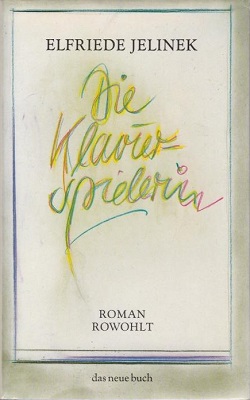
Lust is a novel by Austrian author Elfriede Jelinek. Originally published in German in 1989, it was translated into English in 1992 by Michael Hulse.

Lust is a novel by Austrian author Elfriede Jelinek. Originally published in German in 1989, it was translated into English in 1992 by Michael Hulse.
Lust tells the story of Hermann, a manager of a paper mill, and his wife, Gerti, whom he abuses sexually on a daily basis. They have a son together. Taken to drink, Gerti wanders into a nearby ski resort, where she has a brute encounter with Michael, a self-centered student and hopeful politician. Michael discards her for younger women he seduces regularly. Gerti takes these actions, however, for love and leaves to have her hair done. Later, she returns to find Michael skiing. He abuses her physically in front of a crowd of younger people. Disappointed and disillusioned, Gerti returns home and drowns her son in a nearby stream. [1]
The novel is, like all of Jelinek's novels, lyrical and musical in its structure and features sexual and physical violence. Lust attracted a great deal of controversy upon publication, with many reviewers arguing that the novel is pornography. [2] Critics have noted that "only first names are used to signify the characters. The deletion of the last name of the factory owner and husband Hermann, and his wife and sexual object, Gerti, demonstrates the interchangeability of the characters." [3] The book has been described as a literary culmination of Jelinek's "aesthetics of the obscene." [3]
An excerpt from Lust, accompanied by a short essay, was published in a pro-pornography collection edited by Claudia Gehrke called Frauen & Pornografie (Women & Pornography) in 1988; that same year, Jelinek also contributed to the Emma campaign for an anti-pornography law that would reverse the 1975 reform of criminal law, which liberalized paragraph 184 and "effectively legalized pornography in Germany." [4] Critics have argued that these actions are not "so much indicative of a theoretical indecisiveness on her part as it is of an implicit diacritical principle or norm on the basis of which she seeks to separate a male, exploitative pornography from its female reinterpretation." [4]
Jelinek stated that she set out to write an "erotic, indeed pornographic, novel from a woman's point of view," but found it impossible because the "brutalized language used to describe sex was a purely male language of exploitation." [1]
Radical feminism is a perspective within feminism that calls for a radical re-ordering of society in which male supremacy is eliminated in all social and economic contexts, while recognizing that women's experiences are also affected by other social divisions such as in race, class, and sexual orientation. The ideology and movement emerged in the 1960s.

Carol J. Adams is an American writer, feminist, and animal rights advocate. She is the author of several books, including The Sexual Politics of Meat: A Feminist-Vegetarian Critical Theory (1990) and The Pornography of Meat (2004), focusing in particular on what she argues are the links between the oppression of women and that of non-human animals. She was inducted into the Animal Rights Hall of Fame in 2011.
Sex-positive feminism, also known as pro-sex feminism, sex-radical feminism, or sexually liberal feminism, is a feminist movement centering on the idea that sexual freedom is an essential component of women's freedom. They oppose legal or social efforts to control sexual activities between consenting adults, whether they are initiated by the government, other feminists, opponents of feminism, or any other institution. They embrace sexual minority groups, endorsing the value of coalition-building with marginalized groups. Sex-positive feminism is connected with the sex-positive movement. Sex-positive feminism brings together anti-censorship activists, LGBT activists, feminist scholars, producers of pornography and erotica, among others. Sex-positive feminists generally agree that prostitutes themselves should not be criminalized.

Elfriede Jelinek is an Austrian playwright and novelist. She is one of the most decorated authors to write in German and was awarded the 2004 Nobel Prize in Literature for her "musical flow of voices and counter-voices in novels and plays that, with extraordinary linguistic zeal, reveal the absurdity of society's clichés and their subjugating power". Along with Peter Handke and Botho Strauss, she is considered to be among the most important living playwrights of the German language.

Lesbian vampirism is a trope in 20th-century exploitation film and literature. It was a way to hint at or titillate with the taboo idea of lesbianism in a fantasy context outside the heavily censored realm of social realism.

The Piano Teacher is a novel by Austrian Nobel Prize winner Elfriede Jelinek, first published in 1983 by Rowohlt Verlag. Translated by Joachim Neugroschel, it was the first of Jelinek's novels to be translated into English.
The feminist sex wars, also known as the lesbian sex wars, sex wars or porn wars, are terms used to refer to collective debates amongst feminists regarding a number of issues broadly relating to sexuality and sexual activity. Differences of opinion on matters of sexuality deeply polarized the feminist movement, particularly leading feminist thinkers, in the late 1970s and early 1980s and continue to influence debate amongst feminists to this day.

Michael Hulse is an English poet, translator and critic, notable especially for his translations of German novels by W. G. Sebald, Herta Müller, and Elfriede Jelinek.
Illness or Modern Women is a play by the Austrian playwright Elfriede Jelinek. It was published in 1984 in the avant-garde journal manuscripte of Graz and premiered on the stage of the Schauspielhaus Bonn on February 12, 1987, directed by Hans Hollmann. The play was published in book form by Prometh Verlag in 1987 with an afterword by Regine Friedrich. The title "parodically conflates women with illness." The play is based on an earlier, shorter radio play by Jelinek called Erziehung eines Vampirs, which appeared in 1986 on Süddeutscher Rundfunk.
Lust is an intense craving or drive that is directly associated with the thinking or fantasizing about one's desire, usually in a sexual way.
Feminist views on pornography range from total condemnation of the medium as an inherent form of violence against women to an embracing of some forms as a medium of feminist expression. This debate reflects larger concerns surrounding feminist views on sexuality, and is closely related to those on prostitution, BDSM, and other issues. Pornography has been one of the most divisive issues in feminism, particularly in Anglophone (English-speaking) countries. This division was exemplified in the feminist sex wars of the 1980s, which pitted anti-pornography activists against pro-pornography ones.
Religious views on pornography are based on the broader views of religions on topics such as modesty, dignity, and sexuality. Different religious groups view pornography and sexuality differently.
Melissa Farley is an American clinical psychologist, researcher and radical feminist anti-pornography and anti-prostitution activist. Farley is best known for her studies of the effects of prostitution, trafficking and sexual violence. She is the founder and director of the San Francisco-based organization, Prostitution Research and Education.

Wonderful, Wonderful Times is a novel by Austrian writer Elfriede Jelinek, published in 1980 by Rowohlt Verlag. It is Jelinek's fifth book. An English translation by Michael Hulse was published in 1990 by Serpent's Tail. A film adaptation of the novel, The Excluded, was released in 1982.
Feminism has affected culture in many ways, and has famously been theorized in relation to culture by Angela McRobbie, Laura Mulvey and others. Timothy Laurie and Jessica Kean have argued that "one of [feminism's] most important innovations has been to seriously examine the ways women receive popular culture, given that so much pop culture is made by and for men." This is reflected in a variety of forms, including literature, music, film and other screen cultures.
Was geschah, nachdem Nora ihren Mann verlassen hatte; oder Stützen der Gesellschaften is a play by Austrian playwright Elfriede Jelinek. It was first published in 1979 and premiered in October that year, directed by Kurt-Josef Schildknecht, in Graz.

Only Words is a 1993 book by Catharine MacKinnon. In this work of feminist legal theory, MacKinnon contends that the U.S. legal system has used a First Amendment basis to protect intimidation, subordination, terrorism, and discrimination as enacted through pornography, violating the equal protection guarantee of the Fourteenth Amendment.
Feminist pornography is a genre of film developed by or for those within the sex-positive feminist movement. It was created for the purpose of promoting gender equality by portraying more bodily movements and sexual fantasies of women and members of the LGBT community.
Damion Searls is an American writer and translator. He grew up in New York and studied at Harvard University and the University of California, Berkeley. He specializes in translating literary works from Western European languages such as German, Norwegian, French, and Dutch. Among the authors he has translated are Marcel Proust, Thomas Mann, Rainer Maria Rilke, Robert Walser, Ingeborg Bachmann, Thomas Bernhard, Kurt Schwitters, Peter Handke, Jon Fosse, Heike B. Görtemaker, and Nescio. He has received numerous grants and fellowships for his translations.

The 2004 Nobel Prize in Literature was awarded to the Austrian writer Elfriede Jelinek "for her musical flow of voices and counter-voices in novels and plays that with extraordinary linguistic zeal reveal the absurdity of society's clichés and their subjugating power". She is the tenth female and the first Austrian Nobel laureate followed by Peter Handke in 2019.